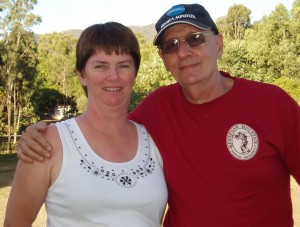
My love Susan and I at her historical property Creekholme
Hello, I’m Stephen Heyer. I live in two places at once, kind of like the way a subatomic particle can be in two places at the same time:
1. Rockhampton in tropical Australia. It is a modestly sized regional center specializing in agriculture, mining, education, good beaches, and not having yet been discovered by the tourists or developers (thank God).
2. In a shack on a sand dune looking out over the sea at Emu Park, which is about 45km East of Rockhampton.
I’m a member of the peak local conservation organization, The Capricorn Conservation Council, as well as other community groups. I enjoy bushwalking, diving, shooting and science, and most of all, communing with my good friends, one of who, Rob, is THE MAN for anything to do with computers or the Internet.
I used to design and build databases but now restrict that to helping an old friend, Des Ryan, with his. My main involvement these days is as a partner with Rob and Jeff in EasyAs Internet.
This provides the wherewithal to live in genteel poverty, and to have the time and resources to study and enjoy the beautiful world I have the undeserved good fortune to have been born into.
Favorite Books
- Flashman series by George Fraser. Faction so good it fooled the historians. Besides, a damm good read.
- Anything by Terry Pratchett.
- Anything by William Gibson
- “The War Hound and the World’s Pain”, by Michael Moorcock. I’m not normally a Moorcock fan but this is brilliant.
- Fire on the Deep. Science fiction at its near best.
- “Schrodinger’s Kittens and the Search for Reality”, by John Gribbin. Quantum theory made easy, well… intelligable with lots of effort, plus the simpliest of the theories. Highly recommended.
- “A Million Wild Acres”, by Eric C. Rolls. The best historian of rural Australia.
- “They All Ran Wild”, by Eric C. Rolls.
- “Among Cannibals”, by Lumholtz, Carl Sofus (1851 – 1922). What Queensland was really like in the late nineteenth century.
- “Joseph Banks a Life”, Patrick O’Brian is at his superb best.
- “The Future Eaters”, by Tim Flannery (1994) which discusses population and management of the environment. Get and read.
- “The Crest of the Wave”, by Willard Bascom. 40 years as a pioneering oceanographer beginning in 1945, Bascom was even involved in the Bikini tests.
- “Under A Sickle Moon”, by Peregrine Hodson. A journey through Afghanistan during the war.
- “Into the Valley of Death”, by Rev. A I Morgan. One Australian’s experience of flying bombers in World War II Europe.
- “Transformation”, by Whitley Strieber. Weird but fascinating.
Favorite Movies
- “The Ghost and the Darkness” All the old myths and virtues such as the “Complete Man” and the premise that reasonable men, by logic and cooperation, can overcome threats. Post-Modernists will hate it, aging positivists will love it. Besides, it’s a darn good movie.
- “Bliss”. (Australian) From the moment Harry dropped dead his life would never be the same again.
- “Alien I” Far better and more realistic than the sequels.
- “The Flight of the Navigator”. Only believable portrayal of an advanced star ship I have seen in a movie.
- “Beverley Hills Cop I”
- “Clueless”. Rented it for a young girl, and to my total surprise I rather enjoyed it.
- “Black Robe”. Must see.
- “Frog Dreaming”. (Australian) Funny, quite a few of the other really good movies I have found recently (“The Flight of the Navigator”) have also been children’s movies. Not being able to depend on sex and violence probably forces them to actually think up a story.
Heyer’s rules of thumb of human behavior, ethics and society
- In the short term, humans can be remarkably good to each other, even strangers, however, over the long term, the relentless drive of evolutionary forces means that:
- Human beings are endlessly opportunistic, self-serving and self-deceiving. That is the secret of their success.
- Most attempts to elaborate core ethics are really attempts by one group to corrupt those ethics and gain advantage at the cost of others (see rule 1).
- People struggle to extend their preferred method of gaining power and privilege and to discredit competing methods (see rule 1).
- For all their intelligence, humans are no better than rats at dealing with the limits of growth (see rule 1).
- All societies are under constant challenge both from other societies and from opportunistic internal groups (see rule 1).
